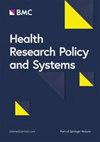卫生决策中的知识转化国家战略:灰色文献综述
IF 3.6
2区 医学
Q1 HEALTH POLICY & SERVICES
引用次数: 0
摘要
如果没有战略行动的支持,将科研证据转化为卫生政策的工作往往会缺失或延迟。本综述系统地描绘和评估了卫生政策知识转化(KT)领域的国家级战略文件,并开发了一个实用模板,以支持欧洲循证政策网络(EVIPNet)国家制定循证决策国家战略。2017年7月至8月,我们根据预先确定的标准对在KT领域负有战略责任的组织的网站进行了电子检索,并于2021年4月至6月进行了更新检索。我们纳入了涉及知识共享活动的国家战略或国家战略要素,以及以国家政策为重点的个别机构的类似战略。两名审稿人对纳入的战略进行了筛选。我们采用定性内容分析法对数据进行了分析。共确定了 65 份独特的文件,其中 17 份符合条件,并对其结构和内容进行了分析。在这 17 份文件中,1 份是国家卫生知识管理行动计划,6 份是机构层面的知识管理策略。其余 10 项战略也包括 2 项国家卫生战略、5 项国家卫生研究战略和 3 项国家知识 技术战略(不单单针对卫生领域)。从收录的文件中总共确定了卫生政策知识、技术和创新战略的 13 个结构要素和 7 个主要专题。从我们绘制的国家战略中可以看出,卫生政策中的知识共享是建立在政策相关研究的生产和获取、政策制定的包装以及与知识交流相关的活动基础之上的。知识、技术和创新战略可以在复杂而又因地制宜的决策过程中发挥不同的作用。我们的研究结果表明,针对卫生领域的循证政策文献的主要观点都出现在这些策略中,但其有效性取决于利益相关者使用这些策略的方式。特定的知识中介机构和组织能力、对证据使用的宣传以及与主要利益相关者的密切合作和共同决策,对于促进研究成果的政策吸收至关重要。本文章由计算机程序翻译,如有差异,请以英文原文为准。
National strategies for knowledge translation in health policy-making: A scoping review of grey literature
Without strategic actions in its support, the translation of scientific research evidence into health policy is often absent or delayed. This review systematically maps and assesses national-level strategic documents in the field of knowledge translation (KT) for health policy, and develops a practical template that can support Evidence-informed Policy Network (EVIPNet) Europe countries in producing national strategies for evidence-informed policy-making. Websites of organizations with strategic responsibilities in KT were electronically searched, on the basis of pre-defined criteria, in July–August 2017, and an updated search was carried out in April–June 2021. We included national strategies or elements of national strategies that dealt with KT activities, as well as similar strategies of individual institutions with a national policy focus. Two reviewers screened the strategies for inclusion. Data were analysed using qualitative content analysis. A total of 65 unique documents were identified, of which 17 were eligible and analysed for their structure and content. Of the 17, 1 document was a national health KT action plan and 6 documents were institution-level KT strategies. The remaining 10 strategies, which were also included were 2 national health strategies, 5 national health research strategies and 3 national KT strategies (not specific to the field of health alone). In all, 13 structural elements and 7 major themes of health policy KT strategies were identified from the included documents. KT in health policy, as emerged from the national strategies that our mapping identified, is based on the production and accessibility of policy-relevant research, its packaging for policy-making and the activities related to knowledge exchange. KT strategies may play different roles in the complex and context-specific process of policy-making. Our findings show that the main ideas of health-specific evidence-informed policy literature appear in these strategies, but their effectiveness depends on the way stakeholders use them. Specific knowledge-brokering institutions and organizational capacity, advocacy about the use of evidence, and close collaboration and co-decision-making with key stakeholders are essential in furthering the policy uptake of research results.
求助全文
通过发布文献求助,成功后即可免费获取论文全文。
去求助
来源期刊

Health Research Policy and Systems
HEALTH POLICY & SERVICES-
CiteScore
7.50
自引率
7.50%
发文量
124
审稿时长
27 weeks
期刊介绍:
Health Research Policy and Systems is an Open Access, peer-reviewed, online journal that aims to provide a platform for the global research community to share their views, findings, insights and successes. Health Research Policy and Systems considers manuscripts that investigate the role of evidence-based health policy and health research systems in ensuring the efficient utilization and application of knowledge to improve health and health equity, especially in developing countries. Research is the foundation for improvements in public health. The problem is that people involved in different areas of research, together with managers and administrators in charge of research entities, do not communicate sufficiently with each other.
 求助内容:
求助内容: 应助结果提醒方式:
应助结果提醒方式:


